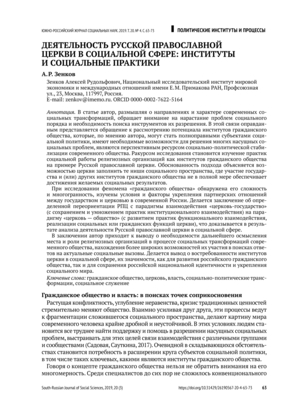Abstract
In the article, the author, reflecting on the directions and nature of modern social transformations, draws attention to the growing problems of social order and the need to find tools to solve them. In this regard, it seems justified to address the potential of civil society institutions, which, according to the author, can become full subjects of social policy, have the necessary capabilities to solve many pressing social problems, are a promising resource for socio-political stabilization of modern society. The research perspective is the study of the practices of social work of religious organizations as civil society institutions on the example of the Russian Orthodox Church. The validity of the approach is explained by the possibility of the Church to fill those niches of social space where the participation of the state and (or) other civil society institutions does not fully ensure the achievement of the desired social results. The study of the phenomenon of "civil society" revealed its complexity and versatility, studied the conditions and factors of strengthening the partnership between the state and the Church in modern Russia. The conclusion is made about a certain reorientation of the ROC from the paradigm of interaction "Church-state "(with preservation and multiplication of practices of institutional interaction) to the paradigm "Church-society" (with the development of practices of functional interaction, the implementation of social or civil functions of the Church), which is proved by the analysis of the activities of the Russian Orthodox Church in the social sphere. In conclusion, the author underlines the importance of the further understanding of the place and role of religious organizations in the process of social transformations of modern society, finding greater opportunities for their participation in the search for answers to current social challenges. It is concluded that the Church institutions are in demand in the social sphere, their importance both for the development of Russian civil society and for the preservation of Russian national identity and strengthening of social peace.
Keywords
References
Забаев, И., Пруцкова, Е. (2013). Социальная сеть православной приходской общины: возможности применения анализа социальных сетей в социологии религии. Вестник Православного Свято-Тихоновского государственного университета (ПСТГУ), 4(48), 120–136.
Зигерт, Й. (2005). Гражданское общество в России. Отечественные записки, 6(27). Режим доступа http://www.strana-oz.ru/2005/6/grazhdanskoe-obshchestvo-v-rossii
Иванова, Т.Ю. (2000). Политическая культура населения как условие существования гражданского общества. В И.А. Бутенко Перспективы самоуправления и самоорганизации в России. Москва: Московский общественный научный фонд.
Лункин, Р.Н. (2018). Русское православие перед лицом социальных вызовов: волонтерство и христианская реабилитация групп риска. Вестник Пермского университета. Политология, 2, 156–171.
Мирошниченко, И.В., Морозова Е.В. (2016). Трансформация политических институтов в пространстве сетевого фронтира. PolitBook, 3, 36–49.
Мчедлова, М.М. (2010). Изменение объяснительных моделей политики: включение религиозных референтов. Вестник Московского Университета. Сер.12. Политические науки, 6, 59–70.
Мчедлова, М.М. (2012). Современные параметры возвращения религии: ракурсы проблемы. Вестник Института социологии, 4, 10–24.
Садовая, Е.С., Сауткина, В.А. (2017). Социальная реальность и социальный идеал в контексте трансформации идентичности. В И.С. Семененко (ред.) Идентичность: Личность, общество, политика. Энциклопедическое издание (с. 114–126). М.: Изд-во «Весь Мир».
Семененко, И.С. (2019). Горизонты ответственного развития: от научного дискурса к политическому управлению. Полис. Политические исследования, 3, 7–26. DOI: https://doi.org/10.17976/jpps/2019.03.02
Ситников, А.В. (2011). Церковь и гражданское общество. Церковь и время, 2(55), 24–37.
Чернега, К. (2018). О формах и правилах господдержки НКО, относящихся к религиозным организациям. Журнал Московской Патриархии, 7, 69–71.
Berger, J. (2003). Religious Nongovernmental Organizations: An Exploratory Analysis. Voluntas: International Journal of Voluntary and Nonprofit Organizations, 14, 15–39. DOI: 10.1023/A:1022988804887
Cladis, M. (2017). Solidarity, Religion, and the Environment: Challenges and Promises in the 21st Century. Changing Societies & Personalities, 1, 353–372. DOI: 10.15826/csp.2017.1.4.023
Clarke, G. (2006). Faith Matters: Faith-Based Organizations, Civil Society and International Development. Journal of International Development, 18, 835–848. DOI: 10.1002/jid.1317
Cnaan, R., Zrinščak, S., Grönlund, H., et al. (2016). Volunteering in Religious Congregations and Faith-Based Associations. In The Palgrave Handbook of Volunteering, Civic Participation, and Nonprofit Associations. Palgrave Macmillan, London.
Crisp, B.R. (2014). Social Work and Faith-based Organizations. London: Routledge.
Edelman Trust Barometer (2019). Executive summary. The 19th Annual Trust and Credibility Survey. Retrieved from https://www.edelman.com/sites/g/files/aatuss191/files/2019–02/2019_Edelman_Trust_Barometer_Executive_Summary.pdf
Herbert, D. (2003). Religion and Civil Society: Rethinking Public Religion in the Contemporary World. Ashgate Religion Culture and Society. England: Ashgate Religion, Culture & Society Series.
Kalkandjieva, D. (2011). А Comparative Analysis on Church-State Relations in Eastern Orthodoxy: Concepts, Models and Principles. Journal of Church and State, 53, 587–614.
Norris, P., Inglehart, R. (2004). Sacred and Secular. Religion and Politics Worldwide. Cambridge: Cambridge University Press.
Robertson, R. & Chirico, J. (1985). Humanity, Globalization, and Worldwide Religious Resurgence: A Theoretical Exploration. Sociological Analysis, 46, 219–242. DOI: 10.2307/3710691
Williams, R. & Berger, P. (2001). The Desecularization of the World: Resurgent Religion and World Politics. Sociology of Religion, 62. DOI: 10.2307/3712234


